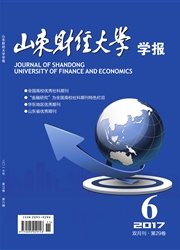

 中文摘要:
中文摘要:
近年来产能过剩日益成为制约中国经济良性发展的顽疾,“去产能”也成为各级政府部门的首要任务。基于中国当前经济现实,文章构建了混合寡占竞争模型,分析了政府对国有企业的管理授权和生产性补贴对国有企业产能过剩的影响。分析表明:(1)在纳什均衡时,国有企业存在产能过剩,而民营企业是否存在产能过剩取决于国有企业的管理授权、生产性补贴等因素;(2)政府对国有企业生产性补贴以及国有企业经理人员激励不足都是国有企业产能过剩的原因;政府减少对国有企业的生产性补贴并增加对经理人员的利润激励可以缓解国有企业的产能过剩问题;(3)民营企业的产能过剩问题与政府对国有企业的管理授权和生产性补贴有关,适当调整生产性补贴和管理授权能解决民营企业的产能过剩问题。
 英文摘要:
英文摘要:
In recent years overcapacity has become a major obstacle to the healthy development of China economy, and therefore "overcapacity cutting" has become the primary task of the government departments at all levels. Based on current China economic realities, this paper constructs a mixed oligopoly competition model and analyzes the influence of government management authorization to state-owned enterprises and productive subsidies on the overcapacity of state-owned enterprises. The analysis results show that : ( 1 ) In Nash equilibrium, overcapacity ex- ists in state-owned enterprises, but whether the private enterprises have overcapaeity depends on such factors as management authorization and SOE productive subsidies; (2) The causes of SOE overcapacity are government pro- ductive subsidies and insufficient incentives in SOE managers, and therefore the reduced government productive sub- sidies and increased incentives for managers can mitigate SOE overeapacity; (3) The overcapaeity of private enter- prises is related to government management authorization to SOEs and productive subsidies, and proper adjustment of productive subsidies and management authorization can solve private enterprise overcapacity.
 同期刊论文项目
同期刊论文项目
 同项目期刊论文
同项目期刊论文
 期刊信息
期刊信息
